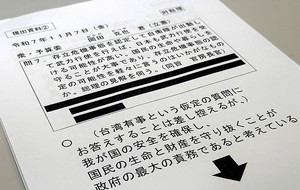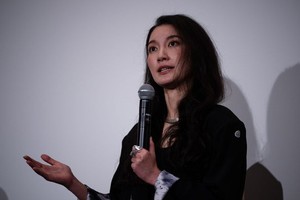By YUSUKE MIYATA/ Staff Writer
April 1, 2025 at 18:04 JST
A freelance director thought misrepresenting an interviewee's answer would make the March 24 episode of "Monday Late Show" more entertaining, a top Nippon Television Network Corp. executive said at a regular news conference where he formally apologized.
“It exceeded the scope of directing. It should never have happened,” said Nippon Television President Hiroyuki Fukuda, whose March 31 apology follows one the company posted on the variety show's website regarding editing a Chinese woman's answers to imply that "People in China eat crows."
He went on to say the company is suspending the show's street interviews for the time being and will also investigate if there were instances of inappropriate editing in past episodes.
According to Nippon Television, the contract director cherry-picked from an interview with a Chinese woman to make it appear that she was suggesting the birds are a normal dish.
"It's because everyone eats them," and "Just stew and eat them, that's it" were two remarks used from her answers about other topics that production staff did not notice were manipulated footage during the pre-airing review stage.
They were, however, directed by the show's producer to fact-check that portion.
Staff reported that, “It was confirmed from the Environment Ministry’s website and other sources that there is such a custom practiced in some parts of China."
An annotation saying, “The custom is not practiced throughout the entire country" was then added to the episode.
The team realized the footage had been manipulated only after the scene blew up on Chinese social media on the evening of March 24.
Nippon Television apologized to the interviewed woman.
When questioned by the company, the director said he did not mean to discriminate.
This does not matter in the eyes of Takahiko Kageyama, a professor at Doshisha Women's College of Liberal Arts, who said the edit is malicious because the content ridicules Chinese people.
"It causes discrimination. It should not be permitted, regardless of genre," said Kageyama, who is also a former Mainichi Broadcasting System Inc. producer.
He is also concerned the incident might increase public distrust of street interviews and negatively affect TV show production. This is on top of growing concerns over privacy and the established difficulty of finding willing participants for such interviews.




















A peek through the music industry’s curtain at the producers who harnessed social media to help their idols go global.
A series based on diplomatic documents declassified by Japan’s Foreign Ministry
Here is a collection of first-hand accounts by “hibakusha” atomic bomb survivors.
Cooking experts, chefs and others involved in the field of food introduce their special recipes intertwined with their paths in life.
A series about Japanese-Americans and their memories of World War II